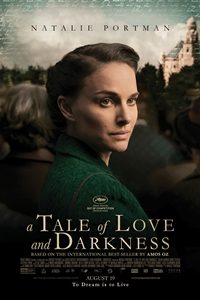 Natalie Portman shines as a master storyteller in “A Tale of Love and Darkness”
By Kaely Monahan
Natalie Portman shines as a master storyteller in “A Tale of Love and Darkness”
By Kaely Monahan
Natalie Portman’s "A Tale of Love and Darkness" combines the mystic allure of a foreign film with the heart jerking influence of an indie film. Adapted from Amos Oz’ autobiography, the film is both dark and poetic. Portman not only stars as Fania Oz, Amos’ mother, but she also wrote and directed the film.
This is Portman’s debut feature-length film as a director and writer, and it could not be more beautiful or well composed. Set almost entirely in Jerusalem, the story is seen through the eyes of young Amos (Amir Tessler). His world is quaint and warm, but that changes as his perfect family disintegrates.
Set in the mid-1940s after World War II, Jews from all over the world are settling in Israel, which is yet to be an independent state. It's a moment in time when anything is possible when the violence seen in Israel today could possibly be avoided.
The violent descent of the country mirrors Amos' mother's decline as if she is a foil for the country itself. Portman's Fania starts off with dreams and aspirations that are quickly dashed as the roles of wife and mother consume her. As the demands of her life increase, Israel finds itself embroiled in a bitter conflict with the native Palestinians. Fania breaks as the country does.
Portman’s version of the Jewish mother is sincere and recognizable, unlike the stereotyped portrayals that clutter many films. She is loving, doting, but also a mom who struggles to create a world of possibilities for her child.
Gilad Kahana plays the father Arieh Oz. A linguist and highly educated man, he is dedicated to his family as much as his work. However, this is a movie about a mother and her son.
We see Fania as a young girl from Eastern Europe who is uprooted by her family to Jerusalem at the outbreak of the war.
She’s a girl of hopes, dreams, and fantasies. When she marries, she turns her personal dreams into stories that she and Amos tell together. She imparts wisdom to her boy, giving him all the tools for life. It’s a tragically beautiful relationship that comes crashing to an end.
When Israel wins its nationhood, it is as though all the life goes out of Fania, leaving her son and husband at a loss. Whether there is a physical problem that could not be diagnosed or if it is a deeper breaking of her spirit, Fania eventually dies. Meanwhile, the country is bathed in the blood of conflict.
The story, while tragic, it is unabashedly human. This could have easily been a vanity project for Portman; a chance to show off her skills as a writer, director, and actress. But the story never strays there. Instead, Portman's performance is heartfelt. But the Academy-Award winning actress doesn’t overshadow the rest of the cast. Instead, there are strong performances all around.
What makes this film even more remarkable is that it is almost entirely in Hebrew. Perhaps, it shouldn’t be too surprising since Portman was actually born in Jerusalem, though she grew up in the U.S. Nonetheless, it is quite a feat for a beloved American actress to pull off.
For a debut, Portman couldn't have done better.
- Kaely Monahan is a journalist, graduate of City University London and the creator of Popcorn Fan Film Reviews. Follow her @PopcornFans and @KaelyMonahan.









